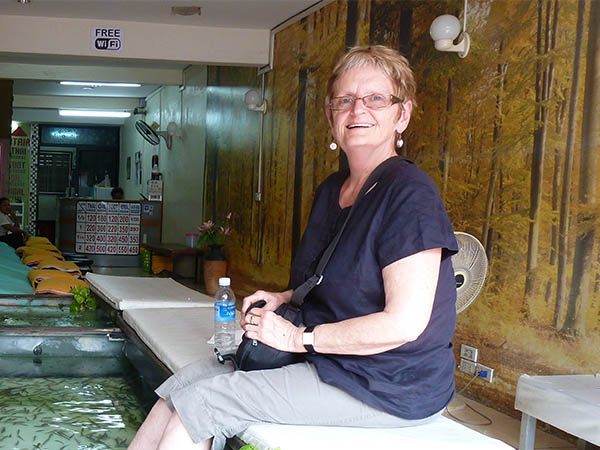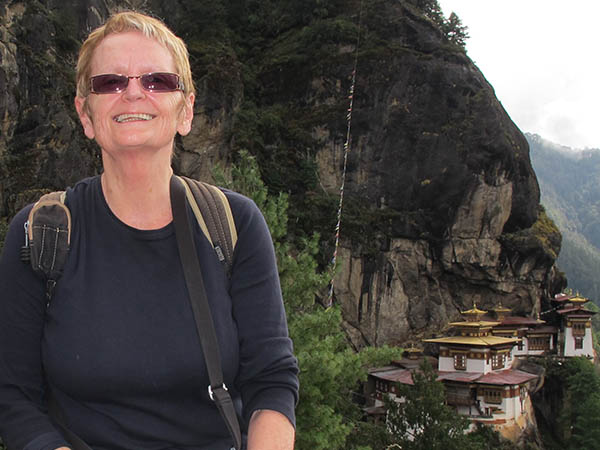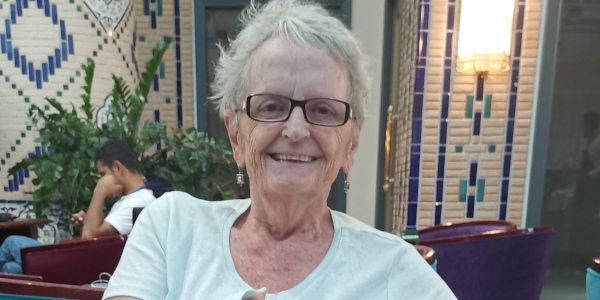
Carol was 72 when a regular mammogram revealed a lump and she was diagnosed with HER2 breast cancer. At the time she was working full time as a general manager in the aged care sector, where she’d worked for most of her life.
“Fortunately, the lump was only very small at that point - so I’m one great advocate for mammograms obviously,” Carol said.
Carol began weekly chemotherapy at the end of 2017 for about three months, then had several weeks of radiotherapy and is now being treated with hormone suppressants and antineoplastic infusions.
“I’m lucky enough to be able to afford private health, and at the time I was working full time and on a reasonably good salary,” she said.
Even with private health insurance however, Carol found the out-of-pocket costs quickly added up. There were additional costs to pay for things like medications, follow-up appointments, scans, specialised bras, parking and allied health treatments.
In 2018, Carol’s company did a restructure and she chose to take a redundancy rather than apply for any of the available jobs.
“At my age, I’m 72, I didn’t want to work full time anymore and I thought I needed to step back a bit,” Carol said.
Even though Carol finished active treatment in 2018, she’s still paying costs related to her cancer, some of which will continue until at least five years after her diagnosis.
“I have a six-month check-up and mammogram that costs about $500, which I get about half of it back,” Carol said. “Each time I visit the surgeon or oncologist I get $35 back.
“I’m paying for hormone suppressants, because I have to be on that for five years. I also had a terrible time with hot flushes and heart palpitations. Every month, I have the cost of those medications for probably at least five years.
“I have an arm port because I’m still having the infusion every six months. They flush the port out every six weeks, and that’s at no cost to me, but of course, I’m at the hospital and so I will continue to pay the $500 excess each year. That goes on for three years, as well as the medication. They’ll leave the arm port in until those infusions are finished and then there’ll be the removal cost.
“I chose to go private, but of course, that brings its own costs with it, because each time you see the surgeon or the oncologist, it costs more money.
“Now I’m on superannuation and I’m not working, the cost is of more concern to me.”

Carol acknowledges it’s been difficult physically, emotionally and financially, but she’s the first to stress that she feels luckier than most.
“I went through the treatment reasonably well and am reasonably optimistic, but there are times when I realise it’s changed me enormously,” said Carol.
“I was always go, go go, active, really interested and I really had to realise I couldn’t keep it up at that pace. People would say, “Well you are 72,”! Well I don’t buy that one. I think it was the cancer that changed how I felt about myself. I definitely feel far more vulnerable.
“I live alone, so I don’t have anyone at home, but I have some very good friends who’ve supported me through this extremely well and my daughter’s been wonderful.
“I guess, in a way, I’m luckier than most. I’ve had resources, both financially and emotionally, but I wouldn’t wish it on anyone. There were times where I thought, this is lousy.”
Carol’s advice to others diagnosed with cancer would be to keep up the exercise, contact Cancer Council for support and find other people who’ve been through the experience and talk to them about it.
“It is frightening being on your own and imagining all sorts of things,” Carol said. “Contact Cancer Council and see what supports and resources are available that would help you. Immediately get the supports in place.

Carol contacted Cancer Council when she lost her hair and received support through the wig service.
“It was really a benefit, going in there, getting the wig, having a chat to them and they offered support, which was really helpful,” said Carol. “That was a real benefit to me.”
In regard to navigating the cost of cancer, Carol’s advice is to negotiate.
“Well depending on your situation, I’d be frank with them,” she said. “Talk to your surgeon and your oncologist and say you can’t afford this, negotiate. Otherwise, it’s just charged, no questions asked.”
Now retired, Carol recognises that things would be different if her cancer returns.
“I’m in remission but if something else happens then (the cost) will be a big issue for me,” said Carol. “If I was paying that same cost now, it would be very difficult for me.”